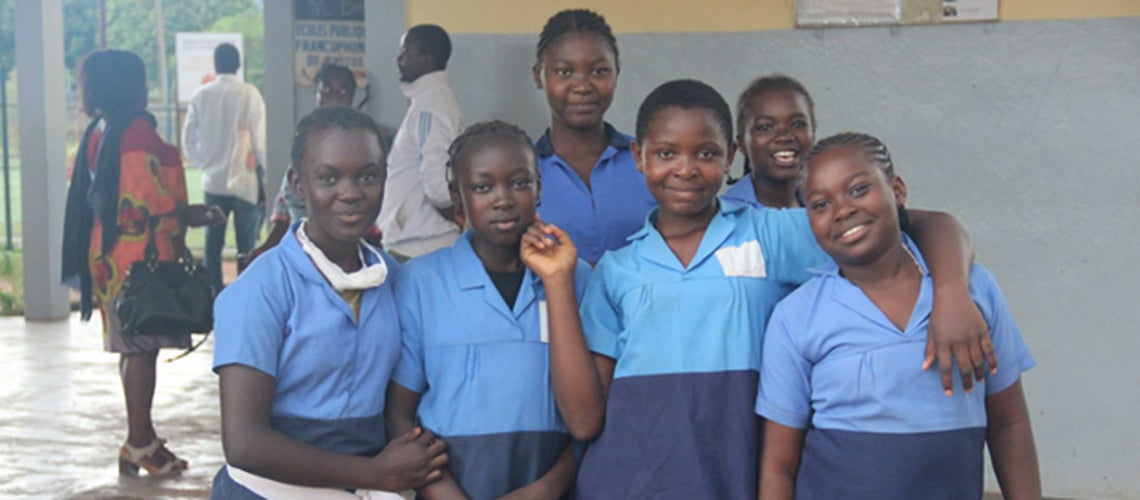 Social changes and inclusion in Cameroon
Social changes and inclusion in Cameroon
For many decades, pregnant young girls in Cameroon have not been allowed to stay in school. School administrators and other community members considered them poor examples for others, and often these girls were dismissed from school, permanently. Unsurprisingly, this resulted in high dropout rates and fewer opportunities for young girls to live healthy and productive lives.
However, in April of 2022, the fate of thousands of girls in the country changed when the government – in collaboration with the Global Financing Facility for Women, Children, and Adolescents (GFF), the World Bank and other partners – amended a national regulation to allow pregnant girls to remain in school.
Along the legal reform process, three key lessons have emerged, including the importance of strong leadership, aligning efforts among partners and understanding community needs to drive social change.
1. Reform depends on strong government leadership and commitment to create inclusive societies with women at the core
In Cameroon, one in every four teenage girls becomes pregnant — mainly as a result of low education levels and lack of access to contraceptives and information on sexual and reproductive health, especially true for girls in the most vulnerable rural communities. Notably, Cameroon’s 24 percent teenage pregnancy rate is the highest in Central Africa, impacting the country’s economic growth and human capital.
The COVID-19 pandemic has made matters worse. Over the past two-plus years, the prolonged school closures, widespread lack of remote learning options, and limited access to safe spaces for young people has exacerbated sexual and gender-based violence — significantly disrupting access to key reproductive health services and potentially contributing to increases in teenage pregnancies.
Determined to reverse this trend, the government began looking for ways to regain lost ground and prioritize the right to education, especially for vulnerable adolescent girls. With the right to education for all protected in Cameroon’s constitution, the government made it a priority, committing to promoting gender equality and creating a more inclusive society with women and girls at the core. In April 2022, with support from the GFF and the World Bank, the government took the bold step to revoke a 1980 circular denying pregnant girls the right to education. The new circular allows them to remain enrolled in primary and secondary schools, along with the protected option of a maternity leave starting at 26th week of pregnancy. In addition, the new regulation is accompanied by complementary reforms to promote expanded access to sexual and reproductive health services and information.
Through this reform agenda, the government aims to reduce gender gaps in education and protect the health and well-being of adolescent girls, specifically shielding pregnant girls against discrimination and social stigmatization.
2. To drive social change, laws must meet population needs and be socialized within communities
Changing national laws deeply engrained in societies is never easy. It requires years of research and a thorough understanding of social norms and behaviors, as well as strategies to reach communities with the right information to change mentalities.
During the amendment process, we conducted focus groups, financed by the Sahel Women’s Empowerment and Demographics Project (SWEDD) project, with pregnant girls, boys, parents, and school principals to better understand their needs and how the older circular was applied in schools. One of the main findings of the focus group has been to increase awareness of the protections under the new regulation among community members, and the need for a robust and culturally appropriate awareness campaign to share tailored messages and incorporated a behavior-centered approached to help tackle stigma and discrimination.
The SWEDD project will also finance community mobilization, legal awareness, and literacy campaigns directed at children and their communities, including those from low-income families or living in rural and underserved areas — as well as key influencers, such as traditional and religious leaders. Outreach efforts will also target girls — especially those who are pregnant or parent learners — to ensure they are aware of their rights under the new circular.
3. Legal reform requires strong partnerships and alignment around government priorities
Although Cameroon is signatory to international conventions protecting the right to education and includes this as a basic right in its constitution, the 1980 circular excluding pregnant girls from school still existed — making coordination across multiple layers of government and several in-country partners critical to the success of the reform.
Under the government’s leadership, a regional legal platform with legal experts established under the SWEDD helped monitor the reform process and the GFF country platform in Cameroon helped leverage partnerships and convene technical partners, such as United Nations Educational, Scientific and Cultural Organization (UNESCO), the United Nations Children’s Fund (UNICEF), the International Organization for Migration (IOM), and civil society organizations. These partners aligned their efforts to support implementation of the new regulation and supported the government in ensuring that the most vulnerable communities across Cameroon were aware of and could exercise their rights.
Similar to Cameroon, other countries in Africa have demonstrated leadership to remove restrictions and discriminatory laws. As countries tackle multiple global crises, including the COVID-19 pandemic, there is an opportunity to promote more reforms to help accelerate equality and build more inclusive communities with women and girls at the core.


Join the Conversation